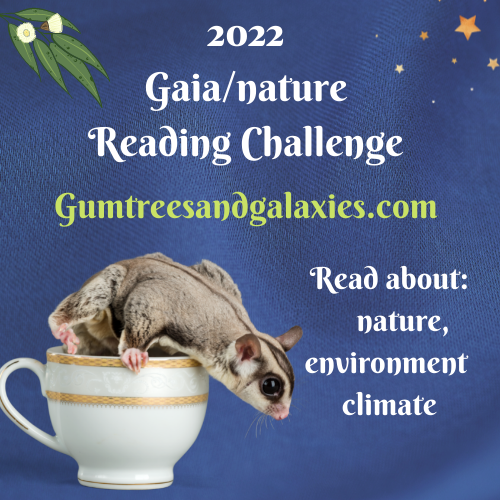First up I want to share a link to Karen’s excellent post on Pearl S Buck’s classic The Good Earth it is one of those classics I have always meant to read. And Curlygeek has written a great post review on How to Give Up Plastic by Will McCallum both the above make good titles for the Gaia/nature reading challenge and Curlygeek has some great personal examples in regards to the plastic dilemma.
Recently I read Jack Ashby’s excellent Platypus Matters: The extraordinary story of Australian mammals, which Brizzy May also previously reviewed for the Gaia/nature challenge. Check out May’s review.

Ashby brings passionate knowledge and insight to this great account of our wonderful wildlife. I must admit it has always puzzled me why we don’t celebrate and value our truly wonderful marsupials more. Ashby makes some very good points about why and how we speak about Australian fauna, now, and in the past and the impact language can have on education and conservation. Essentially, he illustrates how colonialism can pervade even the natural sciences, to their detriment, influencing opinion with values-based judgements and assumptions that “other” or devalue the natural subject. He cites the example of Tim Low and his ground breaking book Where Song Began, (another fantastic read I can highly recommend). Low promotes the largely ignored evidence that all songbirds, parrots and pigeons evolved in Australia, evidence that was initially either ignored or disbelieved, the prevalent belief being that birds evolved in the north and travelled out of Asia into Australia, because nothing so significant could possibly originate here, in this land perceived as empty and backward, (sarcasm intended). Like Low before him, Jack Ashby intelligently corrects some dangerous misconceptions about evolutionary biology in our great southern land.
While platypus might be Ashby’s favourite Australian animal, he is just as fascinated by them all. There is fascinating information on the echidna and the wombat also included. Some great information about the thylacine. He recounts first-hand experience of fieldwork and museum work with humour and contagious enthusiasm. But most importantly he makes us think about how we think and talk about wildlife. I won’t say any more except to say I thoroughly enjoyed this read and loved the fact it gave me much to think about. Check out May’s review.
From the blurb:
A compelling, funny, first-hand account of Australia’s wonderfully unique mammals and how our perceptions impact their future.
Think of a platypus: they lay eggs (that hatch into so-called platypups), they produce milk without nipples and venom without fangs and they can detect electricity. Or a wombat: their teeth never stop growing, they poo cubes and they defend themselves with reinforced rears. Platypuses, possums, wombats, echidnas, devils, kangaroos, quolls, dibblers, dunnarts, kowaris: Australia has some truly astonishing mammals with incredible, unfamiliar features. But how does the world regard these creatures? And what does that mean for their conservation?
In Platypus Matters, naturalist Jack Ashby shares his love for these often-misunderstood animals. Informed by his own experiences meeting living marsupials and egg-laying mammals on fieldwork in Tasmania and mainland Australia, as well as his work with thousands of zoological specimens collected for museums over the last 200-plus years, Ashby’s tale not only explains the extraordinary lives of these animals, but the historical mysteries surrounding them and the myths that persist (especially about the platypus). He also reveals the toll these myths can take.
Ashby makes it clear that calling these animals ‘weird’ or ‘primitive’ – or incorrectly implying that Australia is an ‘evolutionary backwater’ – a perception that can be traced back to the country’s colonial history – has undermined conservation: Australia now has the worst mammal extinction rate of anywhere on Earth. Important, timely and written with humour and wisdom by a scientist and self-described platypus nerd, this celebration of Australian wildlife will open eyes and change minds about how we contemplate and interact with the natural world – everywhere.
I kind of started the Gaia/nature challenge to encourage people to read more and think about the environment and Jack Ashby’s book certainly encourages readers to think about our fauna and how we think and write about them. Nature writing of all kinds, fiction and non-fiction is a favourite genre of mine and no one else seemed to be hosting a nature reading challenge so the Gaia/nature challenge seemed to be a good idea for Gum trees and Galaxies. So what great nature reads have you read recently? would love suggestions and always happy to share links.


One thought on “Gaia/Nature challenge update And Platypus Matters”